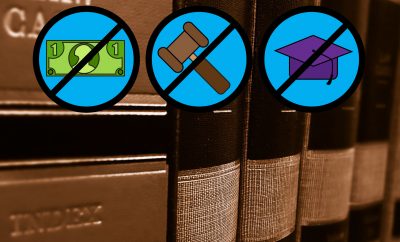
Education
Law School and the Unexamined Life
Shame on me. I only just stumbled upon the paper published in the Journal of Legal Education by University of Michigan law professor Sherman J. Clark last month, arguing that one of the perks of law school is that it helps each student “to thrive, to live a full and satisfying and meaningful life.” Through the Socratic method of lecturing, by training students to look at legal issues from the viewpoints of both parties in each case, by forcing them to confront the reality of uncertainty in both legal doctrines and empirical knowledge, and by teaching students certain ethics, law school helps students “explore the range of possible ways in which one might find meaning in or give meaning to life.”
I agree with Professor Sherman’s basic point, but I would have made the case for it rather differently. An otherwise well-written piece is riddled with highfalutin’, mealymouthed abstractions like, “Thinking well about what people care about and what things mean to them calls upon us to imagine more broadly what might matter and what it is possible for things to mean.” Upon closer inspection, these passages actually do seem to mean something, but they’ll probably strike the average prospective law school student as pretentious gobbledygook.
Nonetheless, I do find that my legal education comes in handy, and not only in, say, knowing my constitutional rights in case I get hassled by the police or knowing that oral contracts are legally binding, too. Mind you, I actually learned that last tidbit on TV when I was a child:
I think that doctrinal and practical legal knowledge proves useful in philosophical contexts, such as in discussions about what is the morally right thing to do in a particular situation. Certainly, the ability to navigate these often treacherous waters — the better to inform one’s ethical choices— is a skill that can help people to live life more meaningfully.
For example, among the basic doctrines that all first-year law students learn are the four elements of a negligence tort. In order to sue someone who’s harmed you through careless behavior, you, the plaintiff, have to prove that the defendant had a “duty of care” — i.e. that the defendant was legally required to take steps to avoid harming others. You also have to prove that the defendant breached that legal duty; that you suffered some form of harm that the law can correct; and that the defendant’s carelessness caused that harm. In later conversations and arguments with my fellow politics and philosophy geeks, the knowledge of those elements has served me in good stead. It’s a very philosophically sound way for the legal system to provide redress for people’s private grievances against each other.
Consider, for example, the duty of care requirement. It makes sense for the courts to require a plaintiff to establish that the defendant had such a responsibility before even proceeding with the lawsuit. Not every situation in life in which your behavior could affect others adversely should require you to spend resources guarding against such harm. Some situations in which people can get hurt are unforeseeable to everyone involved; sometimes it’s not within the alleged wrongdoer’s power to prevent them; sometimes the wrongdoer’s carelessness was only one factor that helped do the damage. The breach of duty criterion makes sense, too; if you’ve done everything the law requires you to do to avoiding hurting anyone, and someone gets hurt anyway, you arguably shouldn’t be liable. Similarly, if you’ve breached your duty of care, but there was miraculously no harm done, or if some harm occurred, but it isn’t clear that your carelessness actually made it happen, then the government shouldn’t force you to compensate the defendant.
The same can be said for the doctrine of “consideration,” which helps determine whether a contract will hold up in court. It basically means that courts can generally enforce agreements that involve some exchange of favors or benefits. Each party to the deal has to give up something of value to the other(s), be it money, products, services or what have you, or the court may not provide satisfaction in the event that one party doesn’t hold up his/her end. This general rule makes sense in light of nineteenth-century English philosopher John Stuart Mill’s “harm principle,” which essentially holds that the government should only restrict personal freedom when it’s necessary to prevent individuals from harming others. In the contractual context, if I make a deal with you that doesn’t require me to sacrifice anything to you in order for you to fulfill your obligations, you probably won’t make me any worse off if you break the agreement. In that case, the government has no business forcing you to pay me back.
These underpinnings of legal doctrines can be helpful in larger philosophical exchanges. In arguments over when government intervention can and cannot be justified, I often refer to certain aspects of tort law to bolster my position that Mill’s harm principle, as I understand it, is a better general rule than the more dogmatically libertarian non-aggression principle. Aggression, as I understand it, involves inflicting harm on others on purpose, whereas negligence entails mere carelessness rather than intentional harm. Yet people can do a world of damage to each other without going out of their way in order to do it. In my view, government has a role to play in trying to prevent negligent as well as deliberate harm.
It’s not only legal rules and doctrines that can serve useful purposes outside of a purely legal context. The nitty-gritty realities of legal practice offer their own useful insights to non-lawyers. My 1L Civil Procedure professor had the whole class read the novel A Civil Action, about a 1980s toxic tort lawsuit in Massachusetts gone tragically awry. One point that the novel drove home for me was the fact that personal-injury lawyers like the protagonist in the book are not charity workers. They’re profit-seeking businesspeople who earn their bread and butter by suing defendants with deep pockets, ones who can actually afford to cough up large sums of money in damages. This issue came up in a recent Facebook discussion, when I threw cold water on an intriguing proposal to abolish criminal law and leave the righting of interpersonal wrongs to civil courts. I pointed out that many heinous acts are perpetrated by low-income people whom ambulance chasers are not exactly in a hurry to sue. And anyway, what restitution could even willing lawyers hope to extract from poor defendants?
Of course, it’s no secret that legal knowledge and training can be helpful in any number of obvious public policy-related ways; Professor Sherman seems to have had a different set of advantages in mind. Nonetheless, although lawyers aren’t exactly known to the general public for being great philosophers, legal education does teach certain ways of thinking that should be appealing to anyone seeking to live a rational as well as a moral life.
Featured image courtesy of [Pedro Szekely via Flickr]







